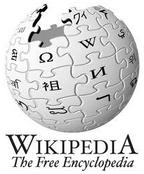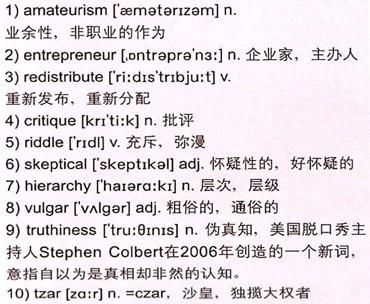无论你接受与否,Web 2.0—第二代互联网,由被动接收互联网信息变为主动创造互联网信息,其代表有维基百科、Youtube、Facebook等等—现在正不断动摇传统媒体的地位。很多人可能还在遥想当年,那时资讯的享用被垄断了,它们需要编辑、审批、甚至定性,才能够有限度、有范围地公布,那时的话语权掌握在极少数的“精英分子”上;只是几年的工夫,我们就进入了一个全新的世界:各类信息几乎毫无保留地冲向我们眼帘,专家和权威的信用被不断挑战,每个人可以说都得到了最大的信息接放自由,甚至思想自由。这难道不是好事吗?因为某程度上人们得到了最大的平等—达到了理想的大同境界!
传统媒体却在这时逆风而行、振臂高呼:这样做是不对的!你们忽略了问题的核心!没有了权威的引领,会导致信息灾难,最后引致社会秩序大崩盘;因为这世上有很多思想尚未成熟、心智尚未开发的人们,他们很容易被利用、被糊弄,他们需要精英们的指引。
到底这东风和西风,谁将会压倒谁呢?近期美国有一个很有意义、很成功的探讨引起了大家对这个问题广泛深刻的思考。本文只是选取了他们讨论的一小部分,希望能起到抛砖引玉的作用,让大家也来思考和讨论一下传统媒体和Web 2.0各自的定位。
传统媒体被Web 2.0打败了? Web 2.0 VS. Traditional Media
发音:英美发音
语速:150词/分钟
使用方法:泛听+讨论
David: Good evening. I'm David Ewing Duncan, Chief Correspondent of NPR's Biotech Nation. I welcome you to this meeting.
 In today's self-broadcasting culture, where 1)amateurism is celebrated and anyone with an opinion can post a video on YouTube, change an entry on Wikipedia or publish reviews on Yelp, we increasingly turn to the collective intelligence of large numbers of people. Should we rely on “The Wisdom of the Crowds”, trusting that they're smarter than the expert few, or is Web 2.0 weakening traditional media to the point where we only have opinion and chaos?
In today's self-broadcasting culture, where 1)amateurism is celebrated and anyone with an opinion can post a video on YouTube, change an entry on Wikipedia or publish reviews on Yelp, we increasingly turn to the collective intelligence of large numbers of people. Should we rely on “The Wisdom of the Crowds”, trusting that they're smarter than the expert few, or is Web 2.0 weakening traditional media to the point where we only have opinion and chaos?
Tonight I'm joined by Jimmy Wales, founder of Wikipedia and the Wikimedia Foundation, and Andrew Keen, Wikipedia critic and author of The Cult of the Amateur: How Today's Internet is Killing Our Culture.
I don't think I really need to introduce these guys, you know, with too much fanfare here, but Wales was ranked 12th in Forbes magazine's Web Celebs 25, and listed in 2006 in Time magazine's 100 most influential people. And I do want to add here that Wikipedia…is it the nineth most viewed…visited site on the…?
Jimmy: Eighth.
David: Eighth. Oooh, okay they moved up a notch.
Jimmy: Hmm hmm.
David: 9.2 million articles and 253 languages; is that…?
Jimmy: Yes, as of this morning.
David: (laughing) Okay. A whole heck of a lot of stuff.
Andrew, over here, is British/American 2)entrepreneur [sic] and former member of the pioneering generation of Silicon Valley visionaries, and he's since done a U-turn, both self-described and, I suppose, real, given his book, and is now the leading contemporary critic of sites like YouTube, MySpace and Wikipedia.
Please welcome Jimmy Wales and Andrew Keen.
(applause)
David: I'm going to ask a couple of, kind of, warm-up questions, here, and we can start with you, Jimmy. I'm gonna ask both of you, from your point of view, what is Wikipedia?
Jimmy: So, Wikipedia is a charitable effort to…with the goal of creating a free encyclopedia in all the languages of the world. So, by “free” we mean free, in the sense of open-source software, so it's freely licensed; people can copy it and modify it, 3)redistribute it; all those things. By “encyclopedia” we mean a high quality reference work. And by “all the languages of the world”, we mean exactly that. We mean for every person on the planet to have their own encyclopedia.
David: Okay. Andrew.
Andrew: I wouldn't call Wikipedia an encyclopedia, and that's not a criticism. An encyclopedia is something where you have centralized editors, who make calls on whether something's more important than something else. So they'll decide that, you know, Henry VIII deserves a larger entry than Henry III or Henry II or Henry the nothing. Wikipedia is an editorless information resource in which anyone is free to enter what they consider to be important information and other people are free to edit that information.
David: Jimmy, should all knowledge be free, or most of it?
Jimmy: I don't think the question “Should all knowledge be free?”, is really the right question to ask. I don't think “should” has very much to do with it. I think that, given the new technologies that we have, the ability to share knowledge, the ability to copy things, the ability to transmit knowledge is radically increased. And so for certain types of knowledge it is possible for the first time to make it available for very, very close to free.
David: A response, Andrew?
Andrew: I mean, we'd all obviously love knowledge to be free. I mean, it's given that, just as we'd love food or drink or this building to be free, but [sic] the realities of our economic system is that nothing is really for free. My biggest 4)critique, not necessarily of Wikipedia though Wikipedia would be included in this, of the Web 2.0 movement is it undermines the value of intellectual labour. It's premised on the idea that there is some virtue in giving away one's intellectual labour without monetary reward. Virtue does not pay mortgages; it doesn't put food on the table.
David: Let's jump to another subject here, which is accuracy. Last night at the dinner table I asked my kids, “Are you allowed to use Wikipedia, you know, for school projects as sources?”, and they said “No”, and I know I'm not, as a journalist. You know, we all use as guides—I guess that's a good word—I certainly do, but where you're not entirely sure it's accurate.
Jimmy: I think what's important here is I think it's a great step forward for us all that we finally realize that we have to be careful about accuracy. One of the interesting things that people don't realize or don't really understand is that Britannica, a product for which I have very great respect, the finest encyclopedia in the English language for many, many years, is 5)riddled with errors. And that's not a criticism of Wikipedia. The traditional processes of the encyclopedia, of the New York Times, of Andrew and his publisher and the editors who reviewed his book before they published it, are good processes. They work pretty well, but they still leave us with works that are absolutely riddled with errors. With Wikipedia, it's a really great thing that people understand there are errors.
Andrew: I think that we're all naturally 6)skeptical. We're all…we're all media-literate people; we all know how to be skeptical. We all understand that Wikipedia is the consequence of the so-called, you know, “wisdom of the group” or “the crowd”—Jimmy isn't so crazy on the “wisdom of the crowd”—certainly the wisdom of some sort of collective group as opposed to an individual. we know how to use Wikipedia. I know how to use it, that's why I use it. It's a…it's a great first step for those people who are media-literate, who know how to be skeptical, who understand that it's a window into the world of knowledge, of information.
The problem with Wikipedia is that for kids—and this is what's really scary—it's for kids who don't have that kind of media-literacy. It's not so much that Wikipedia is wrong; I think Jim is right, I think whether or not, you know, Wikimedia makes six or seven or four or three more times or less times errors than Britannica isn't the issue. My biggest problem with Wikipedia is it doesn't create a 7)hierarchy of knowledge. There is no one at the heart of Wikipedia—and maybe Jimmy should be that person—there is no one at the heart of Wikipedia saying that the entry on Pamela Anderson should be shorter or, excusing the 8)vulgar metaphor, longer than that on Hannah Arendt. So, I may seem old-fashioned, but I believe in knowledge hierarchies. There has to be someone who makes a call on whether Pamela Anderson is more or less important than Marie Curie or Hannah Arendt. And ultimately, when Jimmy stands back and says, “Well that's none of my business. You know, I…who am I to say that Pamela Anderson or 9)Truthiness is less or more important than the concept of truth or Marie Curie or Hannah Arendt?” Ultimately, for those people who go to Wikipedia, who have no media-literacy, who lack the skepticism, the education which we all have, I am fearful that, in this open source free knowledge universe, we are gonna be educating people who are not able to evaluate, not so much to the accuracy of information but the importance of information.
Jimmy: So, that's a really strange argument. (Andrew: Strange?)Questions about the length of articles strikes [sic] me as profoundly bound to a view of the world that has something to do with the economic limitations of print, and even there I don't quite understand it. It's a, you know, Harry Potter, last I checked, is longer than Hamlet. Should someone have said, someone top down directed to say, “Actually Harry Potter's not as important as Hamlet, therefore it should be shorter than it”, we, well; we reject that immediately. That makes no sense. That's a completely separate question. The length question is a completely separate question from the question, “Should there be a thoughtful process that goes into ensuring the quality, the comprehensiveness, the appropriate coverage?” There should be a thoughtful process, and the real question is “Does that process need to be centralized?” Do I have to become the 10)tzar of all human knowledge, which is a job I, frankly, don't want. So…
Andrew: We need to give context to people, we need to help them navigate this remarkably, sort of, dizzying world of information.
Jimmy: So, I agree we need to help them navigate, but I think that's a very different thing from suggesting that a limitation on comprehensiveness is what makes an encyclopedia an encyclopedia. I would rather say Wikipedia…I mean, if we want to say something dramatic about the word encyclopedia, I would say Wikipedia is finally the first realization of the dream of an encyclopedia.

